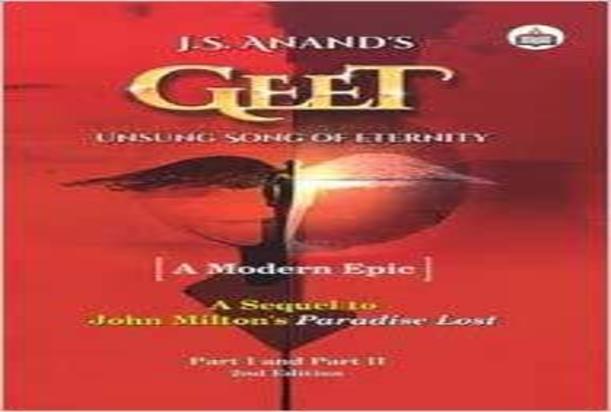Reading Time: 5 minutes
Geet is a modern lyrical epic. What is very important to Anand’s epic is that he has picked up a subject for his epic, which is quite relevant to a man of contemporary times. Man is here used in a generic sense. Man includes both man and woman. The two words in ‘lyrical epic’ have some special connotations. Geet is an epic poem and it has certain basic epic qualities but at the same time, it is not like the classical epic like Paradise Lost or
Fielding’s Tom Jones is an Epic in Prose. Charles Lamb’s Essays of Elia are poetry in prose. The first part of Eliot’s The Murder in the Cathedral is a drama in verse. Some of Shaw’s plays are drama in lyrics too. J.S. Anand’s Geet is a lyric in epic. At a first glance it seems to be a collection of lyric poems. There is hardly any link among those poems and all are disjoined. But a careful reading of Geet reveals that all the poems are organically intertwined so far as the main theme of this lyrical epic is concerned. The war we find in Geet is perennial and in a sense that war which Anand presents in his epic is cosmic in nature. Even in the cover page of his epic he has mentioned “[A Modern Epic] A Sequel to John Milton’s Paradise Lost”, and a reader immediately after reading Milton’s Paradise Lost will feel that he is reading a dramatic text. It seems to me ‘a finely tuned kind of drama which looks too large for the theatre and too wealthy for it in poetic perspectives around the dialogue and debates that take up more room than the tale does’. But Paradise Lost is not a drama. It is an epic. It is an undeniable truth that Milton’s epic is not definitely a drama but it is dramatic and its roots are very powerful. The story of Paradise Lost begins in Hell. The subject matter of the epic has been at the very beginning hinted at when Milton says:
Of Man’s First Disobedience, and the Fruit
Of that Forbidden Tree, whose mortal taste
Brought Death into the world… (Paradise Lost, Book 1)
The key worlds like Man’s, First, Disobedience, Fruit, Forbidden, Tree, etc., all begin with the capital letters. The cardinal theme of Milton’s epic is the fall of Man from the Garden of Eden to this world, Full of woes. And this fall is engineered by the organised conspiracy of Satan. But the first book goes on glorifying the character of Satan. How Satan is glorified is evidenced from one of his speeches when he says:
All is not lost; the unconquerable Will,
And study of revenge, immortal hate,
And courage never to submit or yield: … (Book Lost, Book 1)
But the degeneration of the character of Satan begins from Book IV of Paradise Lost where Adam and Eve are in sleep in the heart of the beautiful Eden. Satan in the form of a cormorant enters the Garden and persuades Eve first and through Eve, Adam to taste the fruit of that forbidden tree. The inevitability is their fall from the Heaven to Earth. The poetic strategy of Milton is to bring about a war between God and Satan. And this war involves the whole of the Cosmos. The war is a war between the virtue and the vice, between the good and the evil. It is a cosmic war. This is one of the cardinal features of an epic poem.

The killing of Meghnad by Lakshmana and Vibhison in the Ramayana has been described by the poet as something highly gruesome and unheroic. And the way Meghnad was killed was a clear departure from the ancient Hindu war code, glorifies the character of Meghnad and pooh-poohs the character of Lakshmana. Madhusudan was a poet who, in a daring way, makes Meghnad a tragic hero. Epic similes are also important features to all classical epics. Anand never employs even a single epic simile in his narratives, considering the artistic relevance to the modern context of his poem. Thomas Hardy’s Dynasts is “an epic-drama of the great war with Napoleon. Hardy’s Dynasts is written not on the background of the distant past. Leo Tolstoy’s War and Peace which is an epic novel is an account of Napoleon’s wars between 1805 and 1812. The epic novel
Geet is a modern lyrical epic. What is very important to Anand’s epic is that he has picked up a subject for his epic, which is quite relevant to the man of contemporary times. Man is here used in a generic sense. Man includes both man and woman. The two words in ‘lyrical epic’ have some special connotations. Geet is an epic poem and it has certain basic epic qualities but at the same time, it is not like the classical epic like Paradise Lost or Madhusudan Dutta’s The Killing of Meghnad. Naturally, we do find epic grandeur or heroism both in the character of Satan and of the Almighty. Man in Anand’s epic is an ordinary man, caught in the modern predicament, pricks of conscience, dilemma, un-decidability, lack of determination, wavering in establishing a
Cast thyself down; safely if Son of God:
For it is written, He will give command
Concerning thee to his Angels, in their hands
They up lift thee, lest at any time
Thou chance to dash thy foot against a stone. (Paradise Regained, p.558)
Nobody can deny that Milton was one of the finest gems of European Renaissance. The remaining part of this article is devoted to the careful examination of Anand’s poems in the context of discourse made above.
(To be continued)
Basudeb Chakraborti
Photos from the Internet
#BookReview #Criticism #MadhusudanDutta #Milton #ParadiseLost #Renaissance #TheKillingOfMeghnad #Geet #Discourse #DifferentTruths















